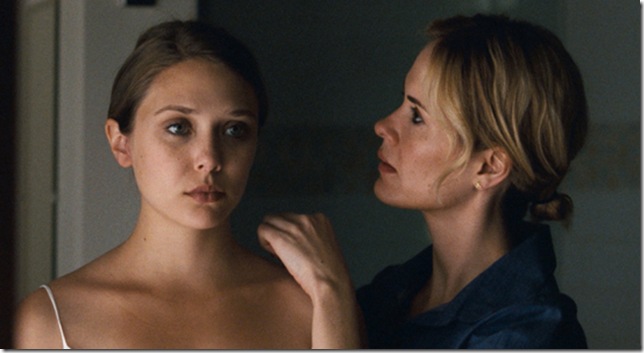Back in January, Ramin Setoodeh wrote a memorable article for Newsweek titled “Crazy Chick Flicks,” which pointed to the tendency for actresses to go psycho to win Oscars.
Natalie Portman, who scored an undeserved statuette for Black Swan, was the most prominent example at the time. Her character was also typical in that she expressed a sexual mania along with her schizophrenia: She was the kind of bonkers that straight men love, the kind that sell movie tickets. If we relied on Hollywood for the latest mental-health dispatches, we’d think all women who suffer breakdowns inevitably accompany them with hypersexuality. Who cares if they’re destroying themselves and their loved ones when they’re so wild in the sack?
Of the many things to love about Martha Marcy May Marlene, the feature-film debut from writer-director Sean Durkin, its attitude toward its increasingly untethered heroine is the most admirable. There are many opportunities for Martha (Elizabeth Olsen), a refugee from a destructive cult, to act in ways that place libidinous sexual confusion above all else. But Durkin demythologizes this convenient prurience for a story, and a character, that are more grounded in tragic, tactile reality.
Fleeing a cult in the Catskills, Martha phones the only family she has left: sister Lucy (Sarah Paulson), who transports Martha to her country house in Connecticut. After two brainwashed years in the communal cult, Martha has to relearn everything she once knew about decorum. Her actions — jumping naked into the pond behind the house, climbing onto her sister’s bed while Lucy is having sex with her husband Ted (Hugh Dancy) — are those of a savage who has not been acclimated to civil society, and Martha’s uncouth flubs reveal just how much these incestuous cults detach themselves from societal parameters; they might as well be sovereign nations.
As quickly as Martha has abandoned her former home — she’s escaped through the woods after a couple of minutes of screen time — the movie slingshots jarringly back to her life in the cult. The rest of the film flashes back and forth between past and present, with Martha’s current associations triggering her memories until the memories become her reality. This subjective structure is elegant in its narrative architecture and believable in its emotional progression (or regression, as it were); we have to live exactly what Martha has to relive, which is enough to drive anyone insane.
The cult leader, Patrick, is played by John Hawkes, who, a year after Winter’s Bone, is independent cinema’s embodiment of the backwoods junkie. His charisma is disputable, but he apparently has enough charm (and intimidation) to attract a growing contingency of wayward nubile girls to his farm. An initiation-by-sodomy from Patrick himself is just the beginning of the personal and psychic terror Martha will be subjected to.
And yet she stays, for two years, mastering her chores, learning the protocols and ushering Patrick’s newest strays into the fold. Martha Marcy May Marlene (the title refers to the other monikers Martha is forced to assume in the cult) is a film of concreteness and immediacy; it doesn’t dwell on the psychological underpinnings that lead a girl from being tearfully raped on a hard floor to becoming a model cult member, in the manner of Ondi Timoner’s great documentary Join Us.
But in some scenes, we understand the cult’s appeal: For once, Martha is part of a loving family, and in Patrick she finds a father figure who sees greatness in her: “You’re a teacher and a leader,” he tells her with pride.
Durkin shot the movie in the 2:35:1 Scope ratio, but his images practically subvert the widescreen panoramas. Martha Marcy May Marlene has the aesthetic constriction of a Dreyer or Bergman film; it’s all close-ups, and most of them are of Martha or her appendages. If some cameras caress their actresses, Durkin’s surveys his subject with a nature photographer’s detachment, resulting in a complete anatomical fascination that transcends vulgar eroticism.
Olsen, known more as being the younger sister to twins Mary-Kate and Ashley than for her scant on-screen resume, is astonishing, giving a tour de force performance of fear, vulnerability, defiance and finally acceptance, if forever haunted by the cult’s presence around every corner. And hey, she may even earn an Oscar nod for it without her character having to screw her sister’s husband. That’s progress.
MARTHA MARCY MAY MARLENE. Director: Sean Durkin; Cast: Elizabeth Olsen, Sarah Paulson, Hugh Dancy, John Hawkes, Brady Corbet, Louisa Krause; Rating: R; Distributor: Fox Searchlight; Showing: Now playing in select theaters
